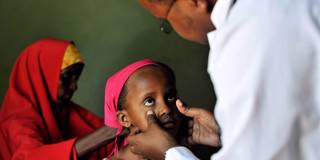There is understandable consternation over Uganda’s plans to send almost 300 health workers to Trinidad and Tobago in exchange for help developing its oil fields. But the truth is that Uganda may have stumbled on a policy that could actually benefit both the health-care sector and the country.
OXFORD – There is understandable consternation over Uganda’s plan to send almost 300 health workers to Trinidad and Tobago. The plan reportedly includes four of Uganda’s 11 registered psychiatrists, 20 of its 28 radiologists, and 15 of its 92 pediatricians. In return, the Caribbean country (which has a doctor-to-patient ratio 12 times higher than Uganda’s) will help Uganda exploit its recently discovered oil fields.

OXFORD – There is understandable consternation over Uganda’s plan to send almost 300 health workers to Trinidad and Tobago. The plan reportedly includes four of Uganda’s 11 registered psychiatrists, 20 of its 28 radiologists, and 15 of its 92 pediatricians. In return, the Caribbean country (which has a doctor-to-patient ratio 12 times higher than Uganda’s) will help Uganda exploit its recently discovered oil fields.